Shortcuts:.
Back to Cyberspace Communications
Be Careful With People You Meet Online
Don't Leave Information Behind
More Cyberspace Communications Topics:

Importance of Being Anonymous
Betty's blog archives.
Protecting Your Information | Communicating Safely | Managing your Online Identity
You have to be constantly on your guard when communicating in Cyberspace.
Be Careful With People You Meet Online
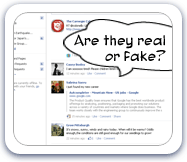
Sometimes it's difficult to tell if someone is telling the truth in cyberspace. Even if you know someone offline, you could actually be chatting with their older sister. Since you can't see or hear them, you have no way of knowing for sure.
Some people are so good at hiding behind a false identity that they can trick you for months, even years. You might be convinced that they are a kid just like you, and that you’ll be perfectly safe if you meet up with them offline. But some kids who have been just as convinced have gotten into some very dangerous situations.
Here's some tips for being safe if you have online friends:
- Be friends with them online, but if you want to meet up offline, meet up with your offline friends like your friends from school.
- Be extremely careful about whom you add to your friends list and block anyone who isn't on your friends list from sending you messages.
- If a friend is not acting like they normally do online - sending strange messages, files, or website links - you should probably stop chatting with them until they act normal again.
- Don't share any personal information with anyone, even if you think you know who they are.
- Use password protection whenever you can, like for comments on social networking sites or blogs.
Keep an Eye On Your Friends
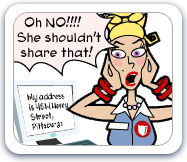
You want your friends to be careful about not revealing personal information online too, so it's a good idea to keep an eye on what they post online, just in case they are putting themselves or other people at risk. If they do post something risky, let them know about it.
You in turn need to be careful not to reveal any of their personal information. Even if you know their offline identities, you should still refer to them by their online identities, their alias, when in cyberspace. It's also good netiquette to check with them before posting anything about them online.
Let your friends know what you're doing to protect them and what you want them to do to protect you in return. You might even need to help them learn how to keep their personal information safe online!
Report Suspicious Behavior
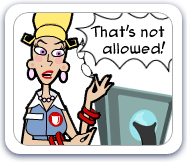
Some social networking sites, instant messengers, online games, and chat rooms give you the ability to flag or report suspicious people if they are disobeying the rules. This is a powerful tool for helping keep cyberspace safe and secure, but it's also not something to be taken lightly.
If you witness inappropriate or suspicious behavior, such as bullying, posting offensive content or violating the Terms of Use, your duty as a cyber citizen is to report them to the moderators, who have the authority to enforce the rules and terms. But, be careful and make sure you know they are doing something wrong, because if you're just goofing around or trying to get them in trouble you might end up in trouble yourself!
Moderators
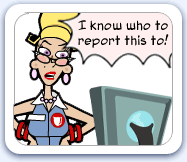
Game moderators
Game moderators make sure that the game is running smoothly and that players are safe and behaving themselves. They understand how the game works and can offer help to players. Some things you should let them know about are game bugs, other players who are breaking the rules or harassing people and questions you have about the game.
Forum moderators
Forum Moderators monitor any content that is posted. In order to maintain order and safety on a forum, moderators can move, delete or pin posts and they can ban users temporarily or permanently. They can also answer questions about the content on the forum. Some things you should let them know about are forum trolls, flaming, offensive content, harassment and rule breaking.
Chat moderators
Chat Moderators watch chat rooms to make sure people aren't chatting about things they aren't supposed to. They warn people about giving out personal information and harassing others. They can ban or mute people who are breaking the rules. Some things you should let them know about are people who are asking for personal information, spamming, rule breaking and harassment.
Use a Safer Social Network
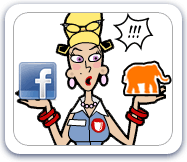
Many social networking sites are not intended for kids and can be an unsafe place. But there are some safer ones for kids that reduce the dangers of social networking sites, like weirdo strangers and revealing too much information.
If you and your trusted adult are searching for a safer social networking site, look to see if:
- The site is run by a reliable and trustworthy company that has a reputation for child safety.
- The company is easy to contact in case there's a problem.
- The site complies with the Children's Online Privacy Protection Act (COPPA). Sites that do must require a parent's permission before they collect or use a kid's information (like for registering an account), and they also must allow parents to review their child's profile and page.
- The site validates the ages of its users (usually by sending a parent an email when their child's account is created), and their policy is to delete any account with false information.
- The site has privacy and security features that let users limit who can see their content.
- Trained moderators are online during times when users can communicate in real time with each other.
- There is an easy way for kids to notify the moderators if they come across something false, inappropriate or that makes them uncomfortable.
- There are language filters that automatically scan any chatting and messages for foul language, bullying and inappropriate conversation and block or scramble them.
Don't Leave Information Behind

Web browsers allow you to store information for convenience, but saving certain types of information in your browser can be risky when you share a computer or if your computer gets infected with malware.
Check the browser's options to make sure that it will ask you before saving any information, and delete anything you saved when you leave the computer. Here's some of the potentially risky information that browsers can save:
- Browsing History - every website you have visited, even the ones you didn't bookmark or accidentally visited.
- Form Data and Passwords - data you have entered into a website form, such as a username and password.
- Web Search History - the strings of words you enter into search engines
- Cookies - the behind-the-scenes files that enhance websites and allow you to log in to them
Protecting Your Information | Communicating Safely | Managing your Online Identity
